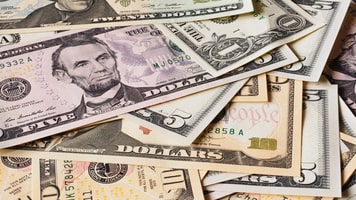
Cash
Cash is an important part of your asset allocation. Cash is used to store value with little to no risk of losing it. While virtually every investor holds cash, most investors do not think about using cash as an integral part of their asset allocation until they retire and need to use it for living expenses.
The key property of cash is that it can be held in a money market or savings account and not lose value, unless you consider the impact of inflation that effects all asset classes. These accounts generally pay the least amount of interest in exchange for the safety they provide by not losing value. In a down market, cash outperforms all other asset classes which is why it is important. Cash can be used for emergency funds, dry powder, or as a ballast for your portfolio. When interest rates rise, the value of bonds decrease which in the short-term causes cash to outperform bonds.
Dry Powder
Dry powder is a term used to describe cash that is being held waiting for an investment opportunity to arrive. An investor that invests in a 100% stock portfolio has a chance to obtain the highest returns, however when the market crashes they have no cash available to take advantage of the next investment opportunity and buy stocks "on sale".
Emergency Fund
A certain amount of cash needs to be set aside for emergencies should you lose a job or have unexpected expenses. Recommendations for an emergency fund range anywhere from three months to three years of living expenses. Of course, if you lose your job, you can cut back on your living expenses to extend your emergency fund. If you maintain a certain percentage of your portfolio in cash, you can earmark it for either dry powder or your emergency fund. If you feel comfortable enough, you can even dip into your emergency fund if the right investment opportunity presents itself.
Where to park cash
![]() You can park your cash in a savings account or certificate of deposit at a bank, or in a money market fund at an investment company. Money market funds typically pay higher interest than traditional bank savings accounts. It is generally a good idea to shop around for the best deal for putting your cash to work for you. The following Vanguard money market fund is currently paying:
You can park your cash in a savings account or certificate of deposit at a bank, or in a money market fund at an investment company. Money market funds typically pay higher interest than traditional bank savings accounts. It is generally a good idea to shop around for the best deal for putting your cash to work for you. The following Vanguard money market fund is currently paying:
Compound interest is the 8th Wonder Of The World. He who understands it, earns it. He who doesn't, pays it.Albert Einstein
![Albert Einstein Compound interest is the 8th wonder of the world. - Albert Einstein]()
Time is money
One of my investing rules is Wait for opportunities to happen, don't try to force them (i.e. be patient). Occasionally I need to rebalance my portfolio when it deviates from my target asset allocation of 60% stocks, 40% bonds + cash. With stocks / equities, the market frequently makes new all-time highs. If I need to sell some stocks to rebalance, I setup a "good til cancelled" (GTC) limit order to sell a portion of my stock ETF at an all-time high which might eventually trigger and bring my portfolio back into balance. This allows me to get a good execution price for my stocks without having to monitor the market every day, and add some money to my cash account which can be used for emergencies or waiting for the next investment opportunity.
Debt
All debts have an associated interest rate. The higher the interest rate, the faster compounding occurs. Investors seek to earn high rates of return given their risk tolerance. Likewise, investors should seek to avoid high interest debt. If you have high interest debt (e.g. credit card debt), the best investment for your cash is to pay down that debt starting with the highest interest rate. While you can make 10% on your cash by investing in the stock market, a better choice is to avoid 18% in interest by paying your credit card debt.
